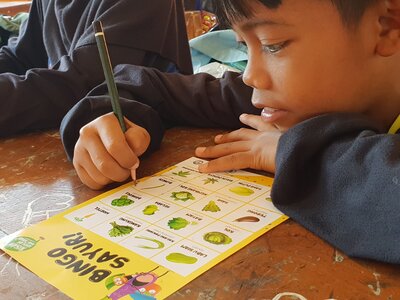Indonesia
- Over 23 million
- people are unable to meet their dietary requirements
- Over 20%
- of children under 5 are stunted (impaired growth due to malnutrition)
- 270 million
- population
Indonesia is an upper-middle-income country, with decreasing poverty, inequality and food insecurity. It ranked 67 out of 127 countries on the 2024 Global Hunger Index. Undernourishment decreased to 8.5 percent in 2023 from 10.2 percent in 2022.
Despite progress in food security and good nutrition, Indonesia continues to face major challenges, including the triple burden of malnutrition – undernutrition, overnutrition and micronutrient deficiencies.
Climate risks and natural hazards further threaten these gains. In 2024, Indonesia ranked as the world’s second most disaster-prone country, affecting 6.3 million people. Extreme weather led to crop failures and rising food insecurity, with 21 percent of children under 5 suffering from stunting.
WFP engages in policy dialogue and provides technical assistance to the Government of Indonesia on food security and nutrition analysis, climate and disaster risk management, and healthy diets.
What the World Food Programme is doing in Indonesia
-
Food security
-
WFP supports the Government’s and partners’ capacities to generate and apply high-quality evidence for reducing food insecurity and malnutrition, through innovative data collection and analysis, identifying of vulnerable populations, and strengthening of resilience against disaster and the effects of climate change.
-
Emergency preparedness and response
-
Nutrition
In focus
When partnership and perseverance make the dream work
“Women, logistics, trucks, warehouses… very cool!”
Meet Dina — on the front-line of responding to disasters in Indonesia
Recovering from a double disaster in Palu
School meals bring income and opportunities to Indonesian communities
Fuelling bodies and feeding dreams
Indonesia news releases
Go to pagePartners and donors
Find out more about the state of food security in Indonesia
Visit the food security analysis pageOperations in Indonesia
Contacts
Office
Jakarta Wisma Keiai, 9th floor, Jalan Jend. Sudirman kav. 3, Jakarta 10220, Indonesia
Jakarta
Indonesia






